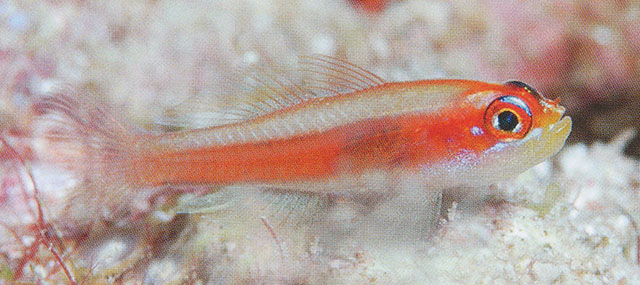| Gobiidae (Gobies), subfamily: Gobiinae |
| 3 cm SL (male/unsexed) |
|
demersal; depth range 3 - 35 m |
| Western Indian Ocean: Comoros. Western Central Pacific: Indonesia (Ref. 47567) and Tonga (Ref. 53797). |
|
Dorsal spines (total): 6-7; Dorsal soft rays (total): 8-8; Anal spines: 1-1; Anal soft rays: 8-8. Distinguished by the following characters: a bony interorbital about 2/3 pupil diameter in width and only slightly concave; absence of troughs or trenches in the interorbital or posterodorsal orbital regions; unbranched fifth pelvic-fin ray, 50-60% fourth ray; epaxialis extending anteriorly to a vertical in line with the posterior margin of the orbit (Ref. 100726); no elongated spines; all pectoral rays unbranched; longitudinal scale series 23; absence of predorsal scales on midline; 1-2 deciduous scales on upper opercle; depth of body 4.0-4.1 in SL; semi-translucent pink on upper half of body (straw-yellow, translucent above midlateral septum, Ref. 100726); midlateral stripe is broad and reddish orange in color; breast and belly, white; narrow light blue lines below eye, dorsal midline of snout and behind upper rear corner of eye (Ref. 90102). |
| Inhabits coastal reef slopes and lagoons. Found along reef margins with rubble (Ref. 48637). Also found in caves and crevices, often on drop-offs in 3-35 m (Ref. 90102). A relatively rare species in collections, usually been taken in lots of one or two specimens (Ref. 100726).. |
|
(Ref. 96402)
|
| harmless |
|
Collected from Pamilacan I. (Ref. 100726). |
Source and more info: www.fishbase.org. For personal, classroom, and other internal use only. Not for publication.
Page created by Jen, 05.08.02,
php script by kbanasihan 06/09/2010 ,
last modified by
dsantos, 20/08/10

